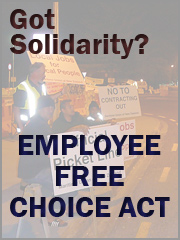
Sign from Recent CODEPINK action on Wall St.
This seems like such an obvious question, yet few in the corporate media noise machine are asking it. A few politicians on the right have made the demand, but this seems like something people across the political spectrum should support.
Treasury Secretary Paulson played a role in creating the crisis as Goldman Sachs' CEO, as I previously quoted Naomi Klein from her appearance on Democracy Now!.
NAOMI KLEIN: You know, Amy, I don’t think we can stress this enough. Henry Paulson is one of the key people, the top people, responsible for creating the crisis that he is now claiming he will solve, you know, and this is—if we think about the 9/11 analogy and, you know, the state of shock that Americans were in after 9/11 and the emergence of Rudy Giuliani as the savior—and, you know, people have so much regret about that. And in the book, I write about this as the state of regression that we go into when we’re frightened. And I think Henry Paulson has really been cast in this role as an economic Rudy Giuliani, saving the day, impartial, bipartisan, a strong leader.
I found this article in BusinessWeek that ran when Paulson was appointed to the Treasury, and I just want to read you one sentence, because I think it’s all we need to know about Henry Paulson. This is from BusinessWeek, when he got the appointment as Treasury Secretary in 2006. The headline of the article is “Mr. Risk Goes to Washington.” It says, “Think of Paulson as Mr. Risk. He’s one of the key architects of a more daring Wall Street, where securities firms are taking greater and greater chances in [their] pursuit of profits. By some key measures, the securities industry is more leveraged now than it was at the height of the 1990s boom.”
Then it goes on to say that when Paulson took over Goldman Sachs in 1999, they had $20 billion in debts. When he—in these high-risk gambles. When he left, they had $100 billion, which means he took their risk level from $20 billion to $100 billion. So it is absolutely no exaggeration to say that Henry Paulson, far from speaking for Main Street, is actually bailing out his colleagues for some of the very debts that he himself accumulated. This is an extraordinary conflict of interest.
If that wasn't bad enough, what about Paulson's performance as Treasury Secretary? If he had done his job properly, the crisis wouldn't be this bad. He would have used the Treasury's regulatory powers to get Wall St. under some control and would have worked with the White House and Congress to repeal previous Wall St. / big bank deregulation efforts. Paulson would have called on the FBI to investigate disreputable mortgages brokerages whose business crossed state lines.
How can we trust a key figure in causing the crisis to be able to fix it? How can someone who has failed in his responsibilities as Treasury Secretary be the correct person to have ultimate decision making power over how the bailout is run?
The corporate media are neglecting to act in the press' role as watchdog. They are acting like lapdogs.











hey libhom, good post, as always.
Also on DN! today, Goodman's interview with David Cay Johnston, where he talks about the lousy media coverage (they were shills for the bankers and WallStreeters:
AMY GOODMAN: What did you think of the media coverage of all of this, David Cay Johnston?
DAVID CAY JOHNSTON: Awful, absolutely awful. And I have been at sites for journalists citing this. You had flat-out falsehoods open the CBS Evening News with Katie Couric and the Nightly News on NBC with Brian Williams Monday, a week ago, when the stock market fell. Both of them said it was the one—the biggest one-day decline ever in the stock market. It isn’t even the biggest in the last twenty-one years. It was the third. Now, it’s a big story, it’s important, but why would you not tell the truth about that? And it’s because they’ve bought into the hype.
The administration, just as it came up with a plan, to focus on using the herd mentality, the gullibility, the lack of skepticism among the Washington press corps and the way that most people there operate, which is on access to sources while ignoring a vibrant, rich public record of documents that will tell you what’s going on, have understood how to play this to a fairly well. And it’s just astonishing to see that—having been so badly burned and embarrassed on the run-up to the war in Iraq to the point where we now know that the government knew there were no weapons of mass destruction, you would have expected skepticism. After all, the first rule of journalism is check it out. And there was not checking here. There was advertising posing as news.
http://www.democracynow.org/2008/10/8/debate